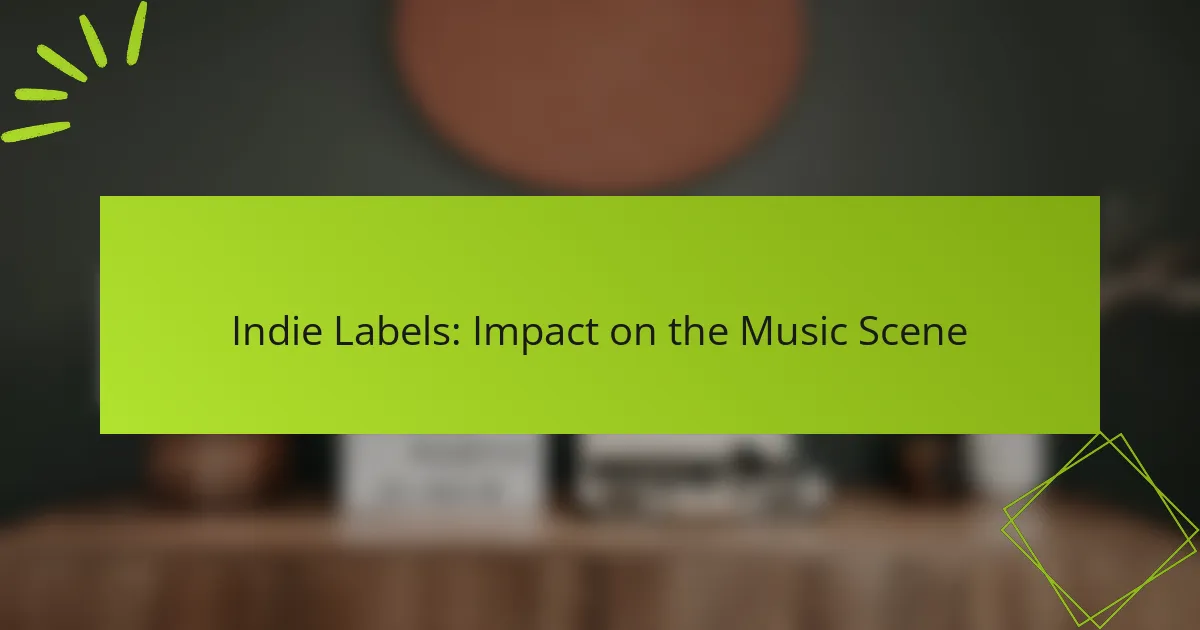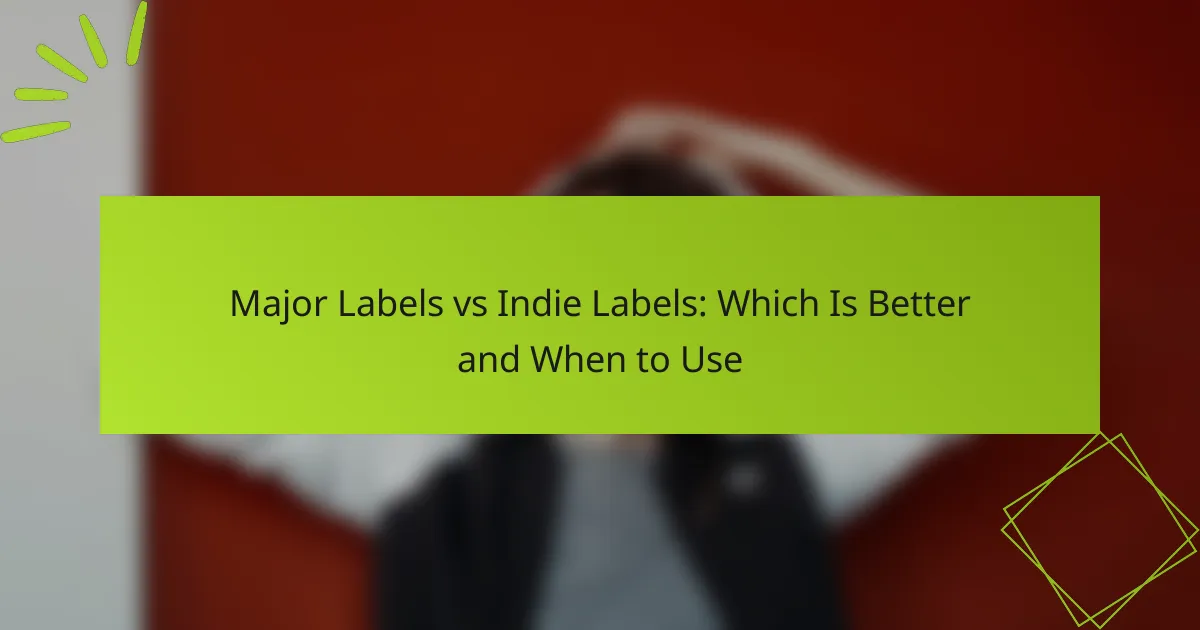Choosing the right indie label is essential for advancing your music career, as it can provide greater creative freedom and personalized support. When evaluating potential labels, consider their reputation, contract terms, distribution capabilities, and how well they align with your genre and artistic goals. Being mindful of common pitfalls, such as overlooking financial stability and support services, can help ensure a successful partnership that enhances your career trajectory.

How to choose the right indie label for your music career?
Choosing the right indie label is crucial for advancing your music career. Focus on factors like reputation, contract terms, distribution capabilities, genre alignment, and the existing artist roster to find a label that aligns with your goals.
Research label reputation
Start by investigating the reputation of potential indie labels. Look for reviews from artists who have worked with them, and check their track record in promoting and supporting their musicians. A label with a strong reputation can enhance your visibility and credibility in the industry.
Utilize social media and music forums to gather insights about a label’s relationships within the music community. Pay attention to how they interact with their artists and their overall standing in the genre you are pursuing.
Evaluate contract terms
Carefully review the contract terms offered by the indie label. Look for clauses related to royalties, rights, and duration of the agreement. A fair contract should provide you with a reasonable percentage of royalties while allowing you to retain some control over your music.
Consider consulting with a music attorney to help you understand complex legal jargon and ensure that the terms are favorable. Avoid labels that impose overly restrictive conditions that could hinder your creative freedom.
Assess distribution capabilities
Examine the distribution capabilities of the indie label. A good label should have established relationships with digital platforms, physical retailers, and streaming services to ensure your music reaches a wide audience. Check if they have a solid plan for promoting your releases.
Inquire about their marketing strategies and how they plan to support your music’s release. Labels that invest in marketing can significantly impact your exposure and sales.
Consider genre alignment
Ensure that the indie label aligns with your musical genre. A label specializing in your specific genre will have a better understanding of your target audience and how to market your music effectively. This alignment can lead to more tailored promotional efforts.
Research the label’s past releases to see if they have successfully promoted artists in your genre. A label with a strong portfolio in your style can provide valuable insights and connections.
Review artist roster
Take a close look at the label’s current artist roster. A label that supports a diverse range of artists may offer more opportunities for collaboration and networking. However, ensure that they also have artists similar to your style, as this can indicate their commitment to your genre.
Consider reaching out to artists on the label to gather their experiences. Their feedback can provide a clearer picture of what to expect and how the label operates in supporting its musicians.
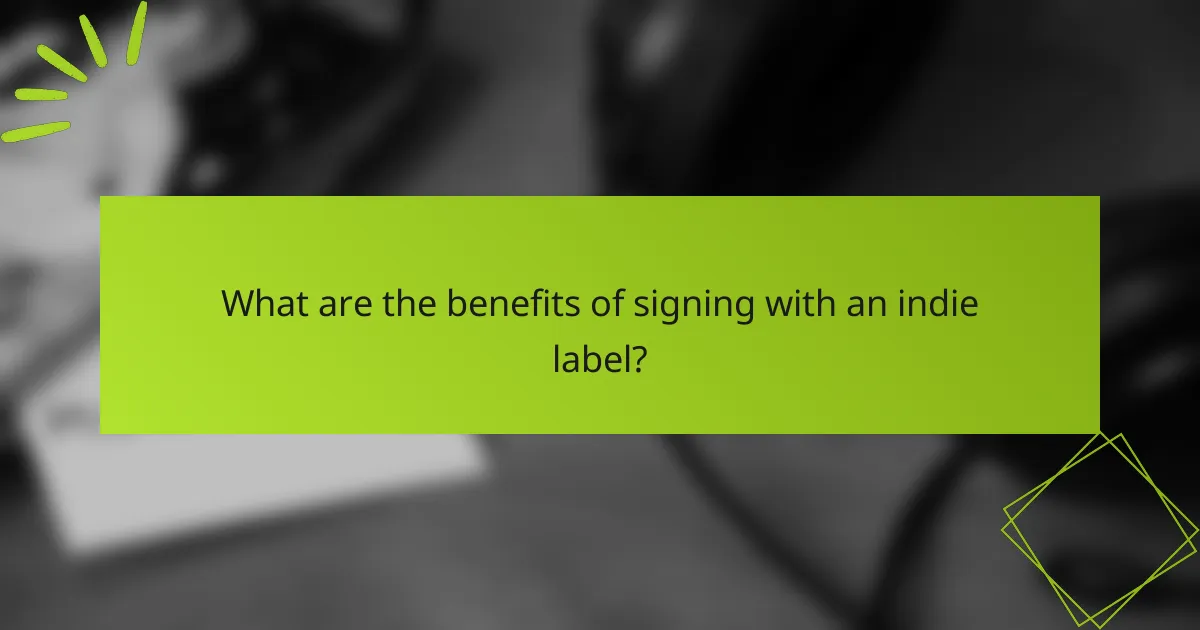
What are the benefits of signing with an indie label?
Signing with an indie label offers musicians several advantages, including greater creative freedom, tailored marketing efforts, and more personal relationships with label representatives. These benefits can significantly enhance an artist’s career trajectory and overall satisfaction in the music industry.
Creative control
Indie labels typically provide artists with more creative control over their music compared to major labels. This means you can make decisions about your sound, artwork, and overall artistic direction without as much external pressure. For example, you might have the freedom to experiment with different genres or collaborate with unconventional artists.
Maintaining creative control allows you to stay true to your vision, which can resonate more authentically with your audience. This often leads to a more engaged fan base that appreciates your unique style.
Personalized marketing strategies
Indie labels often focus on personalized marketing strategies that cater specifically to their artists’ strengths and target audiences. Unlike major labels that may use a one-size-fits-all approach, indie labels can create campaigns that highlight your unique qualities and connect with niche markets. This can include social media promotions, targeted email campaigns, and local events.
For instance, an indie label might leverage your local following by organizing intimate gigs or collaborating with local influencers, which can be more effective than broader, less focused marketing efforts.
Stronger artist-label relationships
Working with an indie label often fosters stronger relationships between artists and label representatives. These labels tend to have smaller rosters, allowing for more individualized attention and support. You may find that your label is more invested in your success, providing guidance and resources tailored to your needs.
Additionally, a close-knit relationship can facilitate open communication, making it easier to discuss ideas, concerns, and future projects. This collaborative environment can lead to a more fulfilling partnership that benefits both the artist and the label.
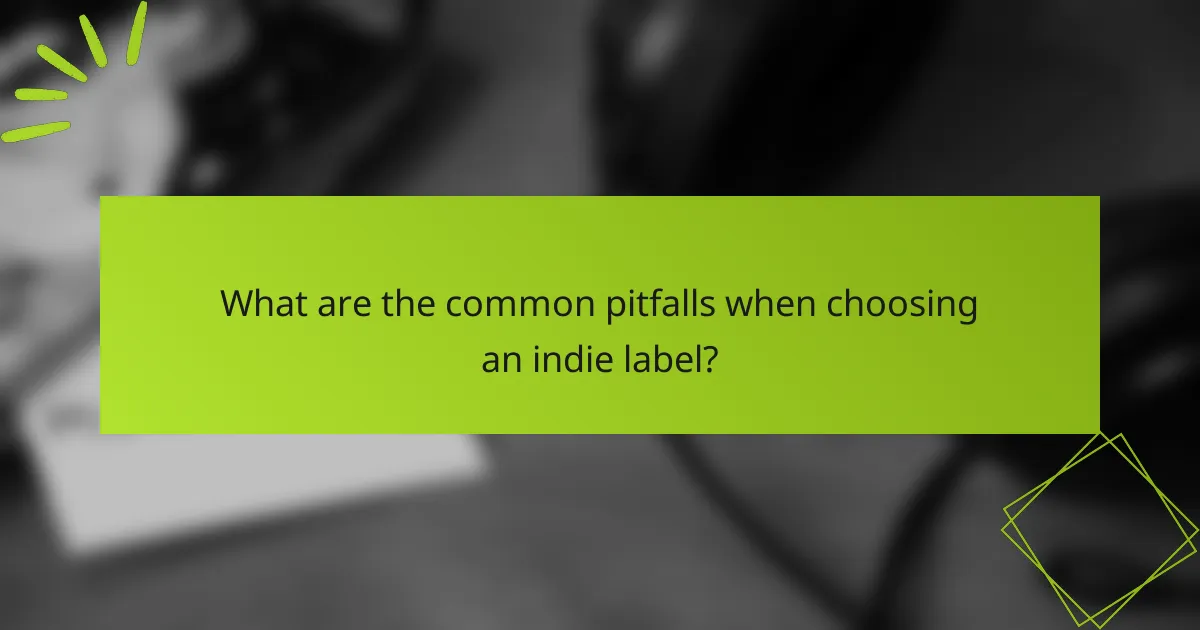
What are the common pitfalls when choosing an indie label?
Common pitfalls when selecting an indie label include ignoring contract details, overlooking financial stability, and neglecting the label’s support services. These factors can significantly impact your music career and the success of your projects.
Ignoring contract details
Many artists fail to thoroughly review the contract terms before signing with an indie label. Key elements such as royalty rates, rights to your music, and the duration of the agreement can greatly influence your earnings and creative control.
Always seek legal advice when evaluating a contract. Look for clauses that may limit your future opportunities, such as exclusivity agreements or unfavorable termination conditions.
Overlooking financial stability
Assessing the financial health of an indie label is crucial. A label that lacks financial stability may struggle to promote your music effectively or fulfill its contractual obligations.
Request information about the label’s funding sources, past releases, and marketing budgets. A label with a proven track record of successful releases and adequate resources is more likely to invest in your career.
Neglecting label support services
Support services offered by an indie label can vary significantly. These may include marketing, distribution, and artist development, which are essential for your growth and visibility in the music industry.
Evaluate what services the label provides and how they align with your career goals. A label that offers comprehensive support can help you reach a wider audience and enhance your overall success.
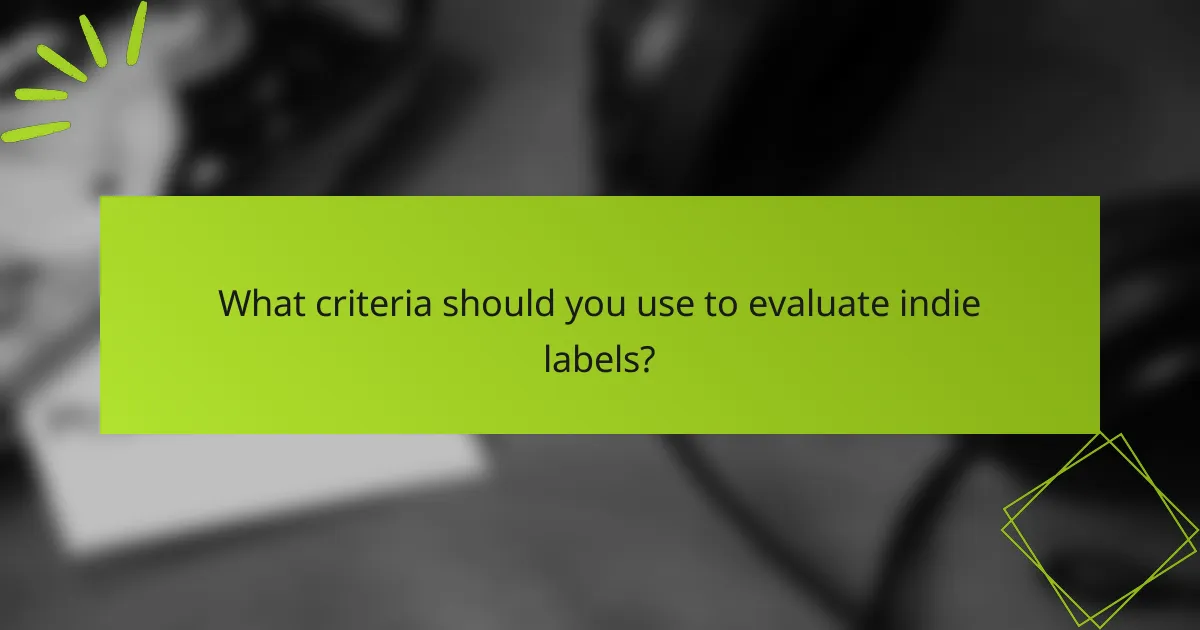
What criteria should you use to evaluate indie labels?
When evaluating indie labels, consider their experience in your music genre, the success stories of their past artists, and their marketing and promotional strategies. These factors will help you determine if a label aligns with your artistic vision and can effectively support your career growth.
Label experience in your genre
Assessing a label’s experience in your specific genre is crucial. Look for labels that have a proven track record of working with artists in your style, whether it’s rock, pop, hip-hop, or electronic. This familiarity often translates to better understanding and support for your music.
Research the label’s roster and past releases to gauge their expertise. A label that specializes in your genre is more likely to have established connections with relevant industry players, such as producers and promoters, which can enhance your visibility.
Success stories of past artists
Investigate the success stories of artists previously signed to the label. Look for tangible outcomes such as chart placements, award nominations, or significant streaming numbers. This can indicate the label’s ability to effectively promote and develop talent.
Consider reaching out to former artists for their insights on the label’s support and resources. Their experiences can provide valuable context about what you might expect in terms of career advancement and creative freedom.
Marketing and promotional strategies
Understanding a label’s marketing and promotional strategies is essential for your decision-making process. Evaluate how they plan to promote your music, including social media campaigns, radio play, and live performances. A label with a robust marketing strategy can significantly increase your reach and audience engagement.
Ask about their budget for promotional activities and how they allocate resources across different platforms. A well-rounded approach that includes digital marketing, traditional media, and grassroots efforts can help maximize your exposure in a competitive market.
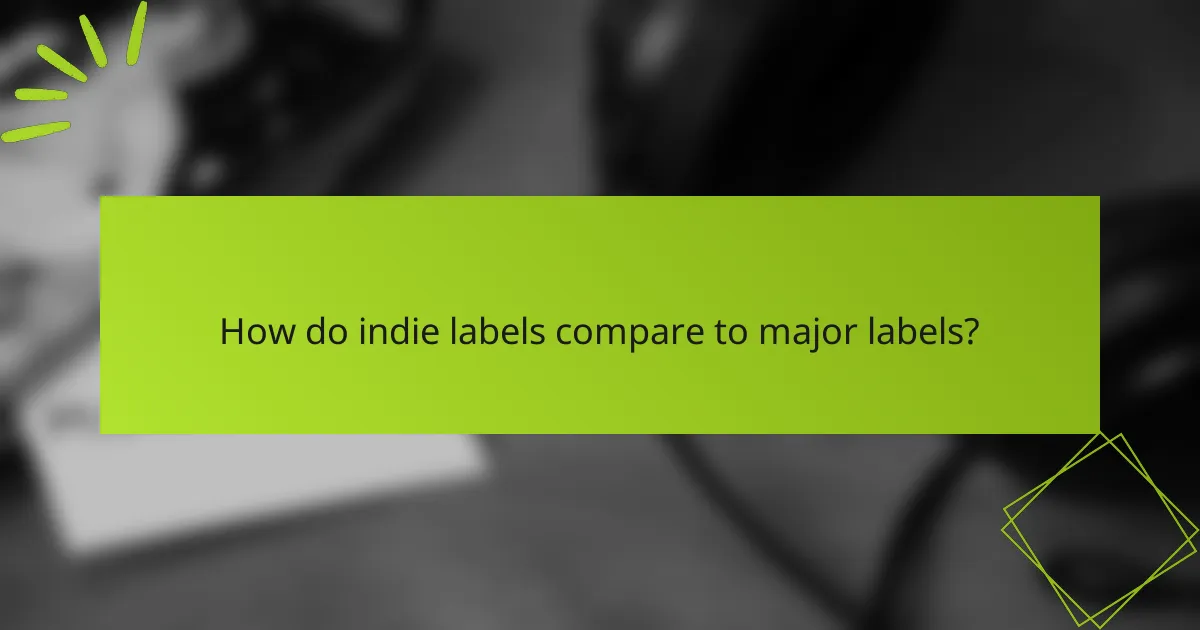
How do indie labels compare to major labels?
Indie labels typically offer more personalized support and creative freedom compared to major labels, which often prioritize commercial success. While major labels have extensive resources and global reach, indie labels focus on artist development and niche markets.
Flexibility in contracts
Indie labels generally provide more flexible contract terms than major labels. Artists may find shorter contract durations and less restrictive clauses, allowing them to retain more control over their music and career decisions. This flexibility can be crucial for emerging artists looking to establish their brand without long-term commitments.
For instance, an indie label might offer a one-album deal, enabling the artist to reassess their options after the project is completed. In contrast, major labels often require multi-album contracts, which can limit an artist’s freedom.
Focus on niche markets
Indie labels often specialize in specific genres or communities, allowing them to cater to niche markets that major labels may overlook. This focus can lead to a more dedicated fan base and tailored marketing strategies that resonate with specific audiences.
For example, an indie label may concentrate on folk music or underground hip-hop, providing artists with opportunities to connect deeply with fans who appreciate their unique sound. This targeted approach can enhance an artist’s visibility and engagement in their chosen genre.
Revenue sharing models
Revenue sharing models with indie labels tend to be more favorable for artists compared to major labels. Indie labels often offer higher percentages of royalties, allowing artists to earn a larger share of their income from music sales and streaming.
Typically, indie labels might offer a revenue split of 70/30 in favor of the artist, while major labels often retain a larger portion, sometimes as much as 80% of the revenue. This difference can significantly impact an artist’s earnings and financial sustainability in the long run.

